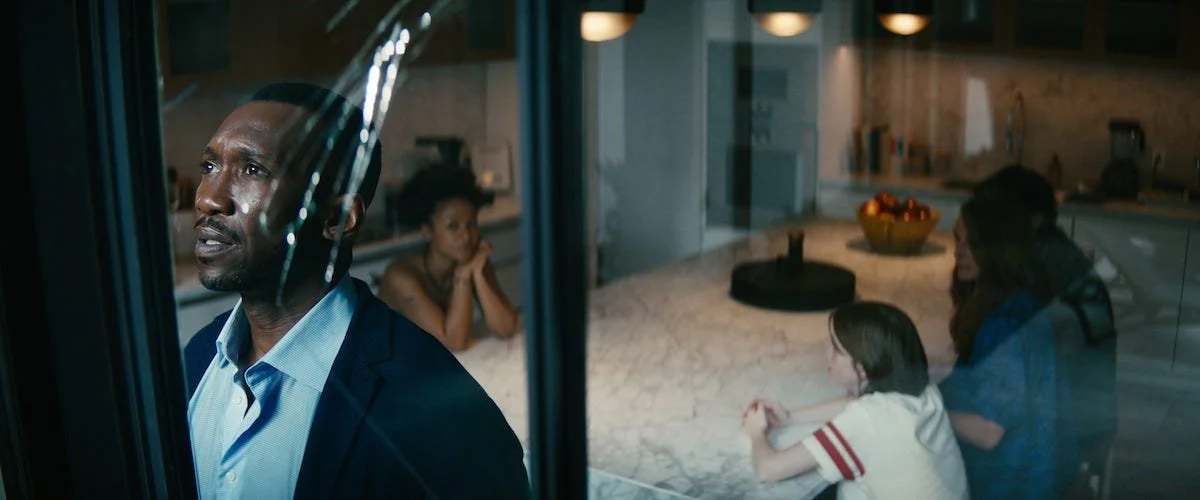I’ve long been interested in Apocalypse media as a sort of window into our cultural beliefs about ourselves and our world. Collectively, at least in the west, we seem to love making them and watching them. Here is some exploratory musing along those lines, sparked by the latest entry in this genre.
“Media can be both and escape and a reflection…” quotes Clay, a professor played by Ethan Hawke, not far into Sam Esmail’s new feature Leave The World Behind. It’s one of those lines that lands a little too heavily and unrelated to anything actually happening and so announces itself as a possible thesis for the film. I generally like things served a little more subtly, but I’ll forgive Esmail in this case because- it’s kind of an interesting thesis.
Leave The World Behind, now on Netflix, gives the apocalypse genre a tightly subjective spin. As things breakdown outside, we only get as much information as the characters have, creating an isolating effect that’s fairly effective. The cast is great all around (with Mahershala Ali stealing the show by a mile as he is want to do). Esmail’s direction is a little heavy handed; there’s a tension between the story’s aspirations toward realism and his more theatrical tendencies. But by sidestepping a lot of the action typical of the genre the film does get at something that most apocalypse stories tend to miss. That is the feeling of sheer displacement that would certainly come with a sudden disconnection from our digital world.
All technology, according to Marshall McLuhan, are extensions of ourselves in some way. The wheel an extension of the foot, the (old fashioned) telephone an extension of the voice, and so on. What does the internet and our smart phones extend? How would we feel if these extensions were suddenly amputated?
Leave The (Digital) World Behind
“We’ve come to rely too much on our technology” seems to be Esmail’s refrain throughout the film. That creates an inherent tension for him though, because here he is using one of the most technology depended story mediums to make a thing you’re going to watch on Netflix. By doing so is he just providing you with an escape from more pressing problems in the real world? Is he part of the problem himself? Or is he reflecting real problems onto your screen in a way that might be part of helping solve something he sees as a problem?
Rose, the professor’s youngest child, is distressed because the internet cuts out before she gets to watch the end of Friends. She cares about those people, she says. “Maybe you shouldn’t care,” is the brother’s suggestion. Callous as it is, maybe he’s right. Is investing hours of our time into fictional people just a distraction from the way the world is teetering on the brink of collapse? Why do I care about these made up people living through an imaginary apocalypse that I’m watching right now?
“Is the world teetering on the brink of collapse?” How you feel about this might depend on how much time you spend lurking the bowels of Twitter (sorry- X), Reddit, or how intently you follow the news moment to moment. It can certainly feel like it. And if the popularity of apocalypse narratives are any indication: Everything falling apart is certainly on people’s minds. The Walking Dead, The Last of Us, Silo, The Leftovers, Snowpiercer, Station Eleven, Interstellar, 28 Days Later, Children of Men, the list could go on and on. It’s not a new phenomenon by any means, but we seem to have an endless attraction to imagining what would happen if society fell apart.
Apocalypse as Fantasy
On some level it might just be a strong hook that plays on our basic anxieties. “What would happen to me?” On another level it can create a space where (usually masculine, machismo) fantasies of survival thrive. It’s hard not to read some apocalypse fiction as a narrative device used mostly to place us in a world where there’s a good “excuse” for violence. The apocalypse is an excuse for a lot of brutal action that would feel played out in other narrative contexts. Although at this point for me it’s also feeling played out in the apocalypse context. Last year I found The Last of Us’s brutality just felt exhausting.
Leave The World Behind plays with some of those tropes in interesting ways, and feels like it’s presenting a somewhat fresh take on the genre. But it still leaves me wondering: are these stories really about the end of the world? Are they really about what we fear? What if they are more about what we can’t admit to ourselves that we desire? Is it possible we quietly long for a world where likes, views, and mortgage rates suddenly no longer matter? Do we sometimes wish for a world where all we had to worry about was what we were doing right now and how we were going to treat the people who are right in front of us?
“That’s crazy.” You might be thinking. “Apocalypse stories aren’t fantasies, they’re dystopian warnings of what could be waiting for us in the future.” Maybe. But have you ever tried to really just face the world as it really is in front of you? Have you ever tried letting go of the stresses that are generated by the words, images, and numbers on the other side of the screens even for a moment, and found it almost impossible?
Perhaps a world after an apocalypse is on of the only ways we can imagine a world that isn’t hopelessly lost in the digital media virtual reality we currently live in. (The other being the retro-manic return to period pieces recently). As Mark Fisher popularized1: “It is easier to imagine an end to the world than an end to capitalism.” Are post apocalyptic stories the only way we can really imagine to tell post-capitalist stories that don’t take place in the past?
It think it’s certainly part of the appeal. But I think there might be an even deeper more shadowy layer to our fascination with stories about the end of the world. I think apocalypse stories might be a doorway to telling stories about about own mortality.
Leave Your World Behind
Maybe, it’s easier to imagine the end of the world then our own world ending. We imagine the apocalypse as an event that happens, which makes it feel like a thing on the horizon, in the future. Not something that is happening already, right now. Or something that will happen for us personally one day. We live in this finite plane. Whether humans can cling to civilized life for the next 100 years or the next 100,000 is to some extent beside the point for the people whose lives, and families are ending now.
Perhaps our obsession with the future is often a way to displace confronting what is right in front of us. We paint it in our stories as: “if the internet and phones stop working then we’d be forced to deal with the real world.” But the real word is already happening now. The phones and the internet often are just a distraction from that. Avoiding Apocalypse would involve all of us willingly accepting a little more apocalypse into our lives today. Creating a world that isn’t hopelessly reliant on technology that could fail us, would require us to put down our technology for a bit to learn how to live without it.
The prepper still sees the apocalypse as an event waiting to happen, denying the reality of the challenges that already threaten our society. Instead of dealing with those threats now and working towards solutions and stronger more resilient communities, they equip themselves to be the hero of their Apocalyptic fantasy. Someone who denies that society faces any existential threat at all sits in the same boat. So does someone who is apathetic because they believe things are too far gone.
I think our cultural dreams of the apocalypse are not about the future. They are about who we are now and the problems we face right now. Perhaps we like them because they give us a way to look at our own personal apocalypse with a sense of plausible deniability. We know that one day our time on this individual world will end whether the whole world does or not. It’s one of the central problems of the human condition. And yet despite it’s universality- our stories rarely deal with it head on. Even the ones that presumably do, like Oppenheimer’s allusions to global annihilation, distract us into thinking the story is really about the man who made the bomb, not the bomb itself. The bomb is what morbidly fascinates us, the man is a distraction. Death is what fascinates us, the apocalypse is mostly a distraction.
World-ending apocalypse narratives allow you to explore all kinds of great questions like: “What is truly important to you?” and “what really matters at the end of things?” But when explored through these stories we can tell ourselves it’s all a fun thought experiment. Those are questions we’ll have to deal with if/when the world ends. But some part of you knows those questions are relevant to your life now, so you pop on yet another movie or show about the end of the world, and enjoy watching it.
“How would we respond to the apocalypse?” somehow seems like a safer question than “how are we going to respond to our own personal apocalypse now?” One is merely a possibility, the other is already happening.
The collective dreams we keep having about the end of the world might be an escape, a distraction, something luring us away from deeper realizations about the reality we’re all facing and living in. That is if we’re caught up in them as fantasies or vision of a future reality. But perhaps if we treat them like our own real dreams, we’ll see them more as reflections of ourselves and our world that we can look into and learn from.

